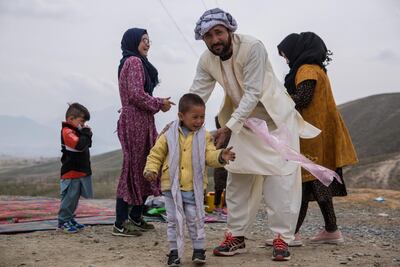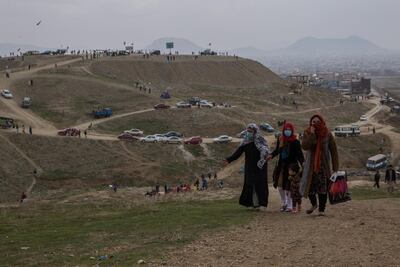Afghans throughout the country celebrated Nowruz, the Persian New Year and the beginning of spring, on Friday, with many heading to the mountains for picnics and dancing.
With many celebrations cancelled because of the coronavirus outbreak – 24 cases have been confirmed in Afghanistan but numbers could be much higher – many families decided to bring in the new year in smaller groups to avoid the risk of infection from large gatherings. Many of the cases have been in the western city of Herat bordering Iran, which has recorded more than 18,000 infections and nearly 1,300 deaths.
The country continues to face political instability after 40 years of conflict, with direct peace talks between the government and the Taliban postponed and presidential elections ending up with two parallel inaugurations, the official one for Ashraf Ghani and the other for his bitter rival Abdullah Abdullah, who considers Mr Ghani’s win illegitimate.
But during such times of uncertainty, many Afghans said they were sticking to their traditions and celebrations, even if those had to be adjusted. The hills on the outskirts of the city were packed with people, as children flew their kites and families enjoyed the early morning hours, sitting on picnic blankets in the grass.
Fasel Begum, 67, said her entire family had been confined themselves to their Kabul house for the past week, but decided to get out for Nowruz. The government has recommended that people keep social distance, but no lockdowns have been enforced.
“We picked a remote spot away from larger crowds and we’re not interacting with any other people,” she explained. “It was important for us to come out and greet the new year. It’s a different time and we are afraid, so we are taking precautions.”
Considered a pagan holiday, Nowruz was banned during Taliban times in Afghanistan, but its traditions have been observed for more than 3,000 years and date back to the Zoroastrian era. This year, Afghans celebrate the start of the year 1399.
Celebrations start at sunrise and include family outings and dinners, as well as the eating of "Haft Mewa" – seven fruits that symbolise blessings and a good start to the harvest season. Just a few days before Nowruz, on the last Wednesday of the year, the festival of fire is celebrated, a kind of bonfire night in which families light small fires that they jump over in a symbolic move to burn the past year’s pain, sickness and worry and exchange it for a new beginning.
Afghanistan’s biggest celebrations are usually held in the northern city Mazar-e-Sharif, home to the famous Blue Mosque and shrine of Hazrat Ali, but have been put on hold until next year as people are discouraged from gathering in large groups because of the coronavirus.
Government offices in the country have reduced their working hours from 8am to 1pm in an attempt to stop the spread of the virus.
The US peace envoy Zalmay Khalilzad called on Afghan leaders in his Nowruz message to reach an agreement on an inclusive government, saying the best gift for Afghanistan would be an end to the political crisis.
Outside Kabul, those celebrating acknowledged that difficult times might be ahead for the country. Safi Ullah, 50, decided to introduce a new tradition to his family who usually take part in a large party that was cancelled.
“We’re planting trees,” he said proudly, digging his shovel into the fresh soil. He made a public call through Facebook for others to do the same. Large-scale deforestation has reduced Afghanistan's forest cover from about 3.5 million hectares in the 1960s to just one million, according to the UN Food and Agriculture Organisation.
“My wife and I want to show our children that we have to take responsibility wherever we can,” he said, adding they planned to mostly stay at home because of the coronavirus outbreak.
The family dragged picnic supplies and music up the hill, celebrating away from distant relatives this year. They still danced though, hoping for better times ahead.
“This year’s Nowruz might be different, but we are making the best of it – and hoping for a better future,” said Safi Ullah.



